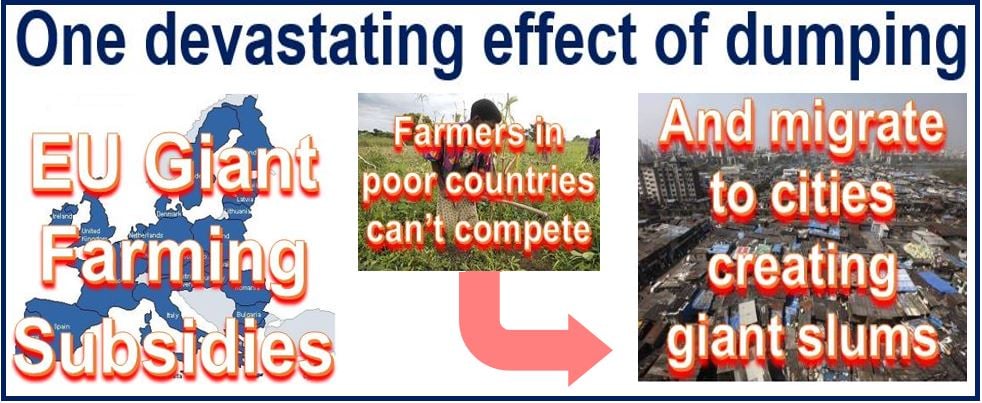In economics, Dumping refers to manufacturing firms exporting goods at a lower price than their domestic price or their cost of production. It is a type of predatory pricing. Predatory pricing is the strategy of temporarily setting prices below cost to undermine and eliminate competition, intending to raise prices after competitors exit the market.
Dumping also refers to agricultural subsidies paid out to farmers in the US and European Union, who then sell many foods around the world at artificially low prices.
There are three main different types of dumping: persistent, predatory, and sporadic.

Persistent-dumping
This is international price discrimination that goes on indefinitely.
Exporting firms benefit from this when demand in a foreign market is more elastic than the demand in the company’s home market.
Predatory-dumping
Used by manufacturers as a means of eliminating competition in a foreign market. High domestic prices are used to supplement the reduced revenue of exporting cheaper goods.
By exporting goods at cheap prices exporters are able to drive off any competition in the area. Once competition has been eliminated, the firm can then raise the price of the product and generate more revenue.
The importing country usually complains, because its market might end up being controlled by a foreign monopoly.
Sporadic dumping
This occurs when there is a temporary surplus of a specific product. Businesses will dump surplus goods in foreign markets without having to reduce prices in their domestic market. The domestic market refers to the market within a country’s borders.
Anti-dumping measures
The World Trade Organization’s (WTO’s) “Anti-dumping Agreement” ensures that its members do not dump things abroad arbitrarily.
The agreement states that measures can be carried out only if sales of a dumped product causes material injury to a domestic industry that produces a similar good.
In the US
Domestic firms can start a petition, and the United States Department of Commerce will determine “whether the alleged dumping or subsidizing is happening, and if so, the margin of dumping or amount of subsidy.”
In the European Union
Firms can file petitions, and an investigation by the European Commission will investigate the case to determine whether: “there is dumping by the exporting producers in the country/countries concerned, material injury has been suffered by the Community industry concerned, there is a causal link between the dumping and injury found, the imposition of measures is not against the Community interest.”
The EU’s Common Agriculture Policy has been accused by many economists of undermining the livelihoods of millions of farmers in developing countries who cannot compete against ‘dumped’ cheap produce in their markets.
The proliferation of such practices has spurred debates on the need for more robust global frameworks to enhance fair trade and protect small-scale farmers globally.
Activists also highlight the environmental toll of such policies, which can lead to unsustainable agricultural practices and exacerbate climate change challenges.
